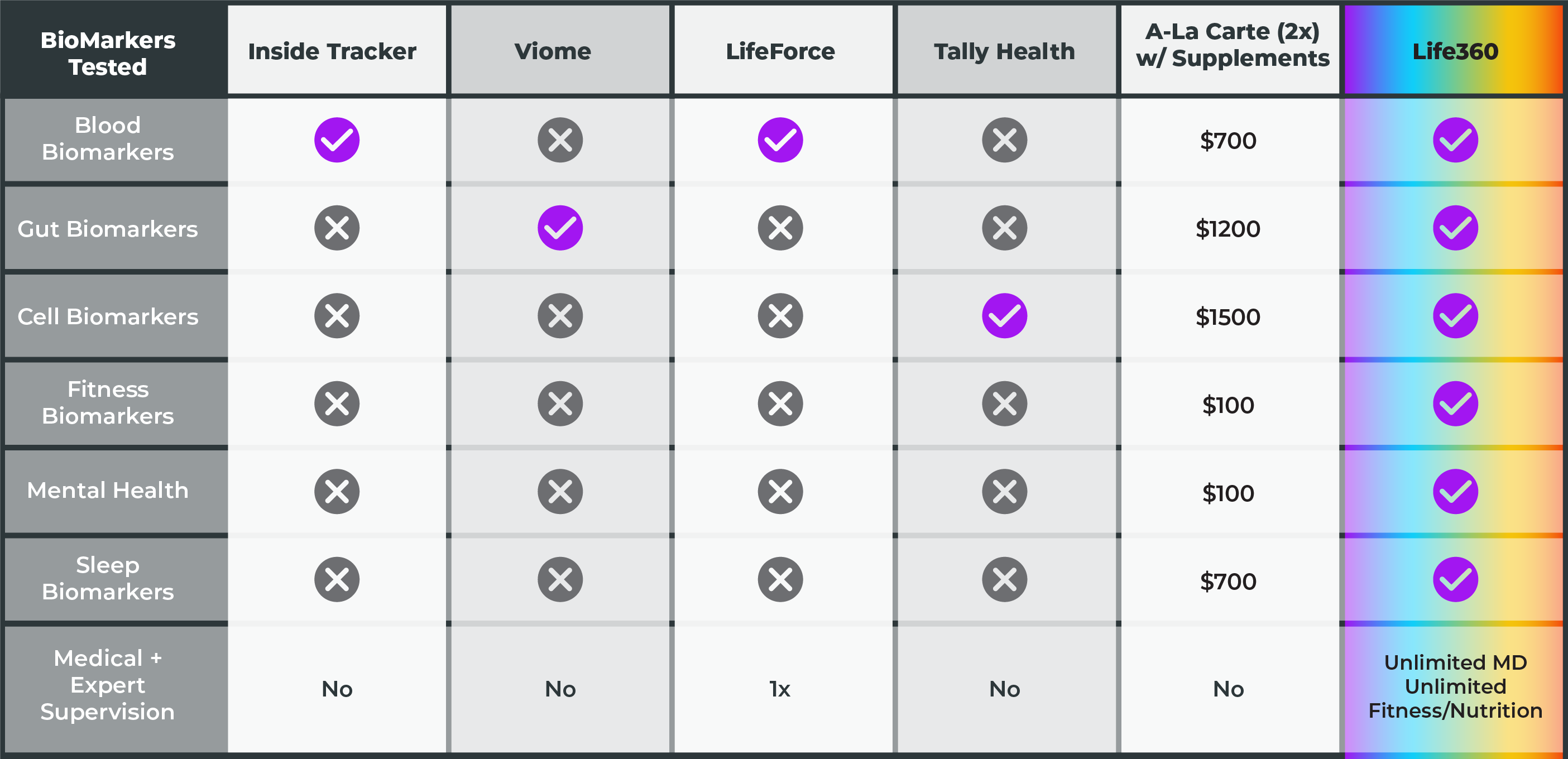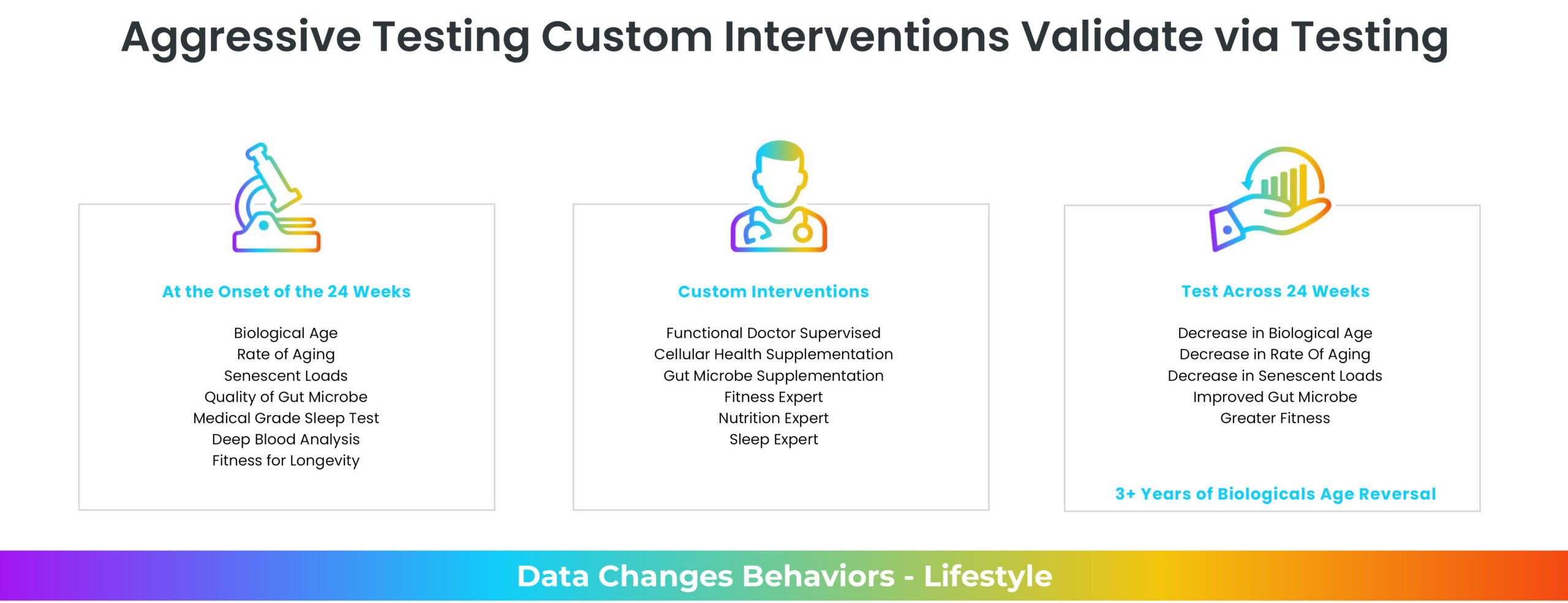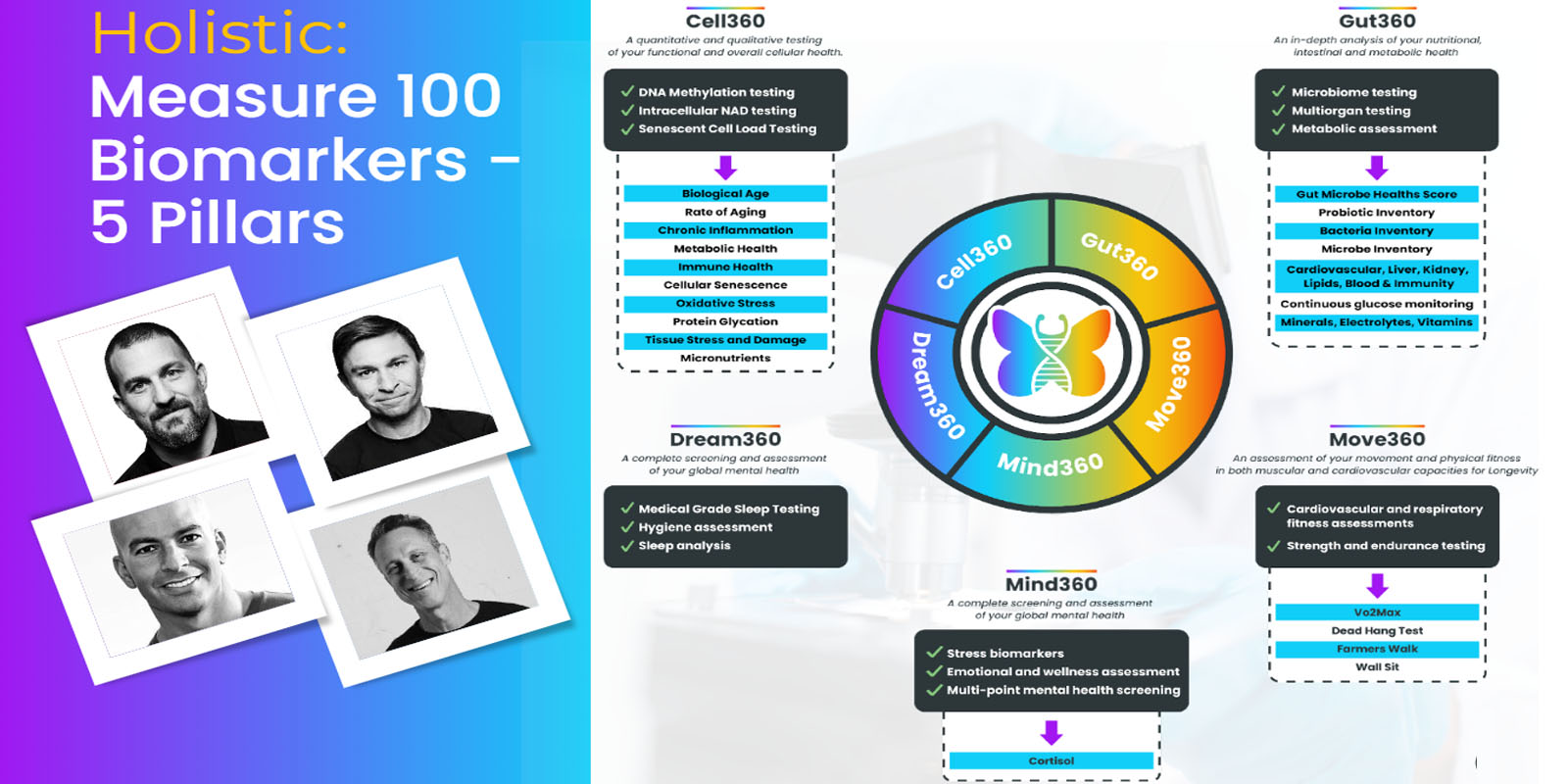PROGRAMS
Introducing Live100: Holistic Comprehensive program to gain 3+ years of Biological Youth

The Holistic Comprehensive program to gain 3+ years of Biological Youth program by Life360 is a comprehensive 24-week program that takes a holistic approach to improving health, wellness, and longevity through expert guidance and data-driven measurements.
Customized Assessment & Interventions
Our program includes pre-tests for biological age, gut microbe, medical-grade sleep, fitness, and mental health assessments. These tests serve as a baseline for creating custom interventions tailored to each individual’s unique needs and goals.
In Week 1, participants undergo a holistic health assessment to establish a baseline wellness score and review customized interventions, including supplements, continuous glucose monitoring, probiotics, fitness programs, mental health programs, and various therapies such as sauna, ice, hyperbaric, NAD, and more.
Ongoing Support & Monitoring
Our team of doctors and coaches will track your progress and give you personalized advice and support throughout the program. You will take bio market tests again over the 24 weeks to confirm that your wellness and biological age have improved. Our holistic approach to health and wellness gives you a complete guide to living your best life. Sign up today and discover the amazing benefits of the Live100 program!
Industry At-A-Glance

Pre Tests:
- Biological Age Tests
- Gut Microbe Tests
- Organ Age Testing
- Medical Grade Sleep Tests
- Fitness Tests
- Mental Health Assessment
Holistic Health Assessment
Baseline Wellness Score
Custom Interventions Review Initiate:
Supplements (12+)
Continuous Glucose Monitor
Probiotics
Fitness Program
Mental Health Program
Sauna, Ice, Hyperbaric, NAD, etc*
Biological Age ReTest
Gut Microbe ReTest/Biological Age
Fitness/Mental/Sleep
Review Progress & Results
Data to show Age Deceleration
Revised Wellness Score
SEROLOGICAL MARKERS
Evaluates organ health by measuring electrolytes, glucose, kidney and liver function markers, and protein levels. Provides insight into overall metabolic function and helps identify imbalances affecting wellness.
Assesses blood cell levels, including red and white blood cells and platelets. Detects anemia, infection, and inflammation, providing an overview of general health status and immune system function.
Measures cholesterol levels, including LDL, HDL, and triglycerides. Assesses cardiovascular health, identifies risks for heart disease, and guides dietary and lifestyle interventions to promote wellness.
Measures liver enzymes, bilirubin, and proteins to assess liver health and function. Helps identify liver damage, inflammation, or impaired detoxification, which can impact overall wellness.
Measures circulating vitamin D levels. Adequate levels are crucial for bone health, immune function, and overall wellness. Deficiencies may contribute to various health issues.
Assesses average blood sugar control over several months. Evaluates diabetes risk and monitors glucose regulation, highlighting the importance of metabolic health and disease prevention.
Measures thyroid hormones (TSH, T3, T4) to assess thyroid gland function. Thyroid health affects metabolism, energy levels, and overall wellness.
Measures testosterone levels and sex hormone-binding globulin. Evaluates hormone balance and supports optimal vitality, muscle mass, mood, and sexual health.
Measures DHEA-S levels, an adrenal hormone. Provides insight into adrenal function, stress response, and overall hormone balance.
Measures estradiol levels, a primary female sex hormone. Evaluates hormonal balance and supports reproductive health, bone density, and overall wellness.
Lipoprotein(a) is a specific type of cholesterol particle. Elevated levels of lipoprotein(a) are associated with an increased risk of cardiovascular disease, including heart attacks and strokes. It can contribute to the buildup of plaques in the arteries, leading to reduced blood flow and potential health complications.
Apoprotein B is a protein that is a component of LDL cholesterol (often referred to as “bad” cholesterol). Measuring apoprotein B levels provides additional information beyond the standard lipid panel measurements. Elevated levels of apoprotein B indicate an increased number of LDL particles, which can contribute to the development of atherosclerosis and raise the risk of cardiovascular problems.
Measures homocysteine levels, an amino acid linked to heart disease and other health conditions. High levels can indicate an increased risk of cardiovascular issues and may highlight the need for interventions to support heart health.
SUPPLEMENTATION
– Mitochondrial dysfunction: NMN supports mitochondrial function and energy production, addressing age-related decline in mitochondrial health.
– Cellular senescence: NMN may help reduce the accumulation of senescent cells, promoting cellular rejuvenation.
– Inflammation: Turmeric exhibits anti-inflammatory properties, reducing chronic inflammation associated with aging.
– Oxidative stress: Turmeric acts as an antioxidant, neutralizing free radicals and reducing oxidative stress.
– DNA damage: Vitamin C helps protect DNA from damage caused by oxidative stress.
– Cellular senescence: Vitamin C may help delay cellular senescence and promote healthy cell function.
– Immune system decline: Vitamin D supports immune function, addressing age-related decline in immune response.
– Bone health: Vitamin D helps maintain bone density and reduces the risk of age-related bone loss.
– Oxidative stress: Vitamin E acts as a potent antioxidant, protecting cells from oxidative damage.
– Skin aging: Vitamin E supports skin health, reducing the impact of environmental factors on skin aging.
– Bone health: Vitamin K2 plays a crucial role in calcium metabolism, supporting bone health and reducing the risk of osteoporosis.
– Stress response: Ashwagandha helps modulate the stress response, supporting resilience and reducing the impact of chronic stress on aging.
– Cognitive decline: Ashwagandha may have neuroprotective effects, potentially reducing age-related cognitive decline.
– Inflammation: Omega-3 fatty acids have anti-inflammatory properties, reducing chronic inflammation associated with aging.
– Heart health: Omega-3 supports cardiovascular health, reducing the risk of age-related heart disease.
– Cellular senescence: Rapamycin inhibits the mTOR pathway, which plays a role in cellular senescence, potentially slowing down the aging process.
– Oxidative stress: TMG acts as a methyl donor, supporting the production of glutathione, a powerful antioxidant that helps reduce oxidative stress.
– Inflammation: TMG has been shown to have anti-inflammatory effects, reducing chronic inflammation associated with aging.
– Autophagy: Spermidine induces autophagy, promoting cellular recycling and rejuvenation.
– Cellular senescence: Spermidine may help inhibit cellular senescence and support healthy cell function.
– Mitochondrial dysfunction: Urolithin A activates mitophagy, improving mitochondrial function and addressing age-related mitochondrial dysfunction.
– Inflammation: Quercetin exhibits anti-inflammatory properties, reducing chronic inflammation associated with aging.
– Oxidative stress: Quercetin acts as an antioxidant, protecting cells from oxidative damage.
– Tissue regeneration: Hyaluronic acid plays a role in tissue repair and regeneration, contributing to overall tissue health.
– Skin aging: Hyaluronic acid supports skin hydration and elasticity, reducing the appearance of fine lines and wrinkles.
– Metabolic dysregulation: Alpha ketoglutarate supports cellular metabolism and energy production, addressing age-related metabolic dysregulation.
– Stem cell exhaustion: Alpha ketoglutarate can support stem cell function, potentially delaying stem cell exhaustion.
– Oxidative stress: NAC boosts glutathione levels, reducing oxidative stress and protecting cells from damage.
– Inflammation: NAC exhibits anti-inflammatory properties, modulating the immune response and reducing chronic inflammation.
– Tissue repair: BPC 157 promotes tissue repair and healing, supporting recovery from injuries and age-related damage.
– Inflammation: BPC 157 reduces inflammation and supports gut and neurological health.



